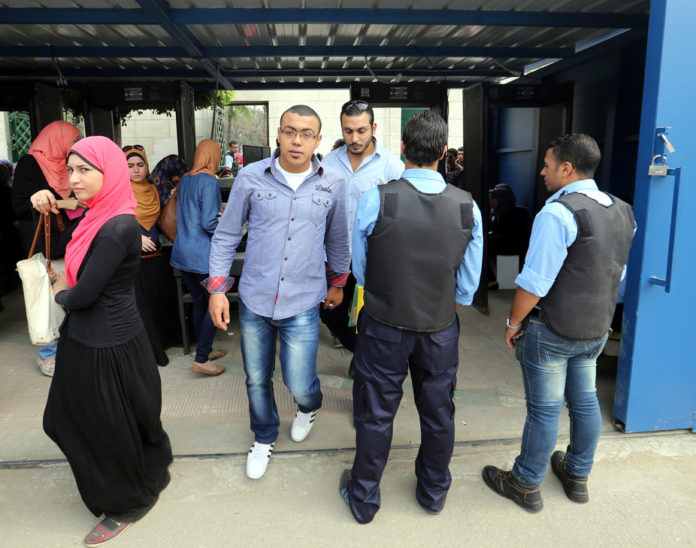
By Randa Aboubakr, Cairo University
Egypt’s new academic year started in early October amid unprecedented repressive measures by the state against students. On October 11, the morning of the first day of university, police carried out a massive wave of arrests – mostly students taken from their homes as they were preparing for their first day of classes. More arrests followed the next morning.
The number of students arrested, allegedly belonging to a student movement called “Students Against the Coup”, is now more than 200 according to the civil society group, Association for Freedom of Thought and Expression. No charges have been pressed against the students, who are now being kept in custody pending trial.
The student movement has long had a political role in Egypt and played a vital part in the national struggle against the British and against the corrupt monarchy during the 1930s and 1940s. Since independence in 1952 the student movement has continued to play a leading role in the struggle against repression and social injustice during successive regimes.
Beefed-up security
Now a new wave of government repression is in full swing.
A private company, Falcon Security, which specialises in anti-protest and riot measures, has started operating on nine campuses nationwide. The company adopted tight and sometimes violent tactics from day one, with students waiting in long queues to be personally searched before being admitted to their schools through poorly constructed magnetic tin corridors. Instances of verbal violence and harassment were widely reported during the first few days of school.
Hostels at a number of universities refused to receive students, under the pretext that renovation work was still in progress, but no specific dates were announced for their opening. The start of the school year (scheduled according to university law to start the third Saturday of September) had already been postponed under the pretext that maintenance work in the dorms had not finished. But it was not difficult to see that the reason was mainly for the authorities to finish implementing a tighter security system both in the dorms and on campuses.
Power-grab over university management
In the midst of all this, Egypt’s president, Abdel Fattah al-Sisi, who – in the absence of a legislative council – has assumed the power of tabling legislation (with his cabinet) issued an amendment on October 13 of the controversial Law for the Regulation of Universities.
Those amendments cancel one of the very few positive changes that had taken place after January 2011, when the academic community managed to reinstate elections for university high officials. This had replaced a system of direct appointment, meaning that officials were both subject to selection according to security measures and responsible to answer to ministers rather than to the large academic community that had elected them. Egypt has now returned to this state control of academia.
Like anywhere else in Egypt, universities are shot through with political strife. Students belonging to the now-banned Muslim Brotherhood have cause for complaint against the Sisi regime, which they accuse of deposing “their” democratically elected president and initiating a wave of indiscriminate persecution against the Brotherhood.
But Muslim Brotherhood students are not alone. Various other political and social forces on the ground are asking for a more egalitarian public sphere where they can voice their opinions, criticise the regime and protest peacefully. This has been categorically denied to them by the current regime under the pretext of curbing the “terrorism” of the Muslim Brotherhood.
Violence on campus
According to another recent amendment of university regulations, university rectors now have the power to call in police forces, armed with tear gas, birdshot and live ammunition, as well as heavy trucks, to raid university campuses when student “riots” break out. During the first week of school, police forces raided at least three university campuses nationwide.
In the face of these restrictions, it was only natural that students would raise their voices and student protests (mainly calling for the release of their detained colleagues) erupted at Alexandria University where the rector called in armed police forces on campus to confront protesting students. Police stormed the campus under a thick cloud of tear gas, while a law student sustained bullet injuries in the neck and head and later died in hospital.
The authorities are blaming the violence on students. Yet photos and video clips as well as student testimonies collected by individual faculty members that I’ve seen testify that in an unprecedented move, the police actually stormed into lecture halls – and were at times firing birdshot at students.
On October 23, the Egyptian minister of higher education appeared in a televised press conference indirectly blaming the dead student by saying that as a law student he had no business being at the faculty of engineering where he was shot. In an obvious attempt to clear the police of any responsibility, even though investigation is still underway, the minister also alluded to the possibility that the student might have been shot by his fellow students in an attempt to frame the police.
Wider clampdown
As an academic in Egypt, it is not difficult to see the clamping down on universities as part of a more general policy that the new regime is trying to establish: an iron fist over civil liberties and a stifling of dissent on all levels, no matter whether it is Islamist or otherwise.
State-controlled media is launching a fierce campaign against activists, establishing a narrative that the January 25, 2011 revolution was a conspiracy concocted by enemies of the state that was corrected by the military’s soft coup of July 2013. The Muslim Brotherhood in particular – and Islamist politics in general – are projected as the enemy, seeking to dismantle the state. Any rejection of that narrative of events is seen as suspicious if not downright subversive.
In that context, it is not surprising to see that the student movement erupt with little fear of the possibly violent consequences. The clashes and repression that have already taken place have inflicted considerable damage on student life and on the educational process in Egypt. But in a broader sense they reflect the subtle negotiations that continue between an emerging authoritarian regime and a strong and determined student movement. This academic year looks like it will be a decisive one.
![]()
Randa Aboubakr does not work for, consult to, own shares in or receive funding from any company or organisation that would benefit from this article, and has no relevant affiliations.
This article was originally published on The Conversation.
Read the original article.




















